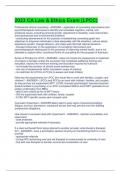2023 CA Law & Ethics Exam (LPCC)
Professional clinical counseling - ANSWER-- application of counseling interventions and
psychotherapeutic techniques to identify and remediate cognitive, mental, and emotional issues, including personal growth, adjustment to disability, crisis intervention, and psychosocial and environmental problems
- conducting assessments for the purpose of establishing counseling goals and objectives to empower individuals to deal adequately with life situations, reduce stress, experience growth, change behavior, and make well-informed rational decisions
- focused exclusively on the application of counseling interventions and psychotherapeutic techniques for the purposes of improving mental health, and is not intended to capture other, nonclinical forms of counseling for the purposes of licensure.
Scope of Practice for LPCC - ANSWER-- does not include the assessment or treatment of couples or families unless the counselor has completed additional training and education, beyond the minimum training and education required for licensure - not include the provision of clinical social workservices
- can use of assessments within counselors' scope of practice. - no restriction for LPCCs or PCCIs to assess and treat children
What are the requirements for LPCC who would like to work with families, couples, and children? - ANSWER-- LPCCs and PCCIs can work with children, families, and couples as long as they are supervised LMFT, LCSW, licensed psychologist, licensed physician (board-certified in psychiatry) or a LPCC (completed 500hrs and 6 MFT graduate hrs w/ written confirmation from BBS).
- take 6 sem units/9 qtr hrs of MFT theory
- 500 hrs supervised work with children, family, couples
- 6 CEU MFT specific course each renewal cycle
Counselor impairment - ANSWER-Being alert to early signs of personal problems (fatigue, burnout, depression, substance abuse) that may prevent one from fulfilling professional obligations.
How should a counselor deal with impairment? - ANSWER-- maintain consultation and supervision
- seek treatment
- provide appropriate referrals if necessary
If a client will benefit from being referred to another provider, what should a therapist do? - ANSWER-- have a termination session focusing on transitioning them to a new provider
- appropriate referrals
- clt sign ROI authorizing new and old therapist to communicate for continuity of care
- f/up with new therapist to transfer records and coordination of care What could potentially happen if therapist is unaware of his/her personal values, attitudes, and beliefs? - ANSWER-- incorrect diagnoses and poor tx decisions
- bias toward one or more family members (if qualified to work with couples and family)
- may become overly friendly/hostile with a clt
- likely to miss or misinterpret impt clinical info
How to manage impact of therapist's attitudes? - ANSWER-- consider how attitudes are impacting tx
- seek supervision or consultation to ensure quality of care
- personal therapy to identify source of attitudes/beliefs/values
- refer if it continues to interfere, be careful not to abandon and referral is not discriminatory in nature
T/F: If therapist refers clt out based on personal attitudes about race, gender, or other protected characteristics, the therapist is not engaging in discrimnation. - ANSWER-
False, it is discrimination
Autonomy - ANSWER-CLT has fundamental right to choose for themselves what kinds of mental health they will participate in, except for those who present an imminent danger to selves or others (involuntary hospitalization)
- clt can discontinue/change provider any time
What is the primary reason for the existence of legal and ethical obligations? - ANSWER-to protect the best interests of clients
When there is a direct conflict between the code of ethics and the law, what should a therapist do? - ANSWER-follow what the law dictates
T/F: The agency policies trumps the code of ethics for counselors. - ANSWER-False, agency policies does not excuse a counselor from following ethical obligations.
informed consent for counseling - ANSWER-an ethical principle that research participants be told enough to enable them to choose whether they wish to participate
___________ is the cornerstone of the counseling relationship according to ACA Code of Ethics. - ANSWER-Trust
respect the dignity and promote the welfare of clients - ANSWER-primary responsibilities of counselors
In developing a treatment plan, who is in charge? - ANSWER-counselor and clt collaborating
T:/F Counselors can engage in a personal virtual relationship
with individuals with whom they have a current counseling relationship (e.g., through social and
other media) to establish rapport. - ANSWER-False, counselors are pohibited
What are the core professional values of the counseling profession? - ANSWER-1. enhancing human development throughout the life span;
2. honoring diversity and embracing a multicultural approach in support of the worth, dignity, potential, and
uniqueness of people within their social and cultural contexts;
3. promoting social justice;
4. safeguarding the integrity of the counselor-client relationship; and
5. practicing in a competent and ethical manner.
What are the fundamental principles of professional ethical behavior? - ANSWER-
AUTONOMY
NONMALEFICENCE
BENEFICENCE
JUSTICE
FIDELITY
VERACITY
Autonomy - ANSWER-fostering the right to control the direction of one's life
Nonmaleficence - ANSWER-do no harm
Beneficence - ANSWER-working for the good of the individual and society by promoting
mental health and wellbeing
Justice - ANSWER-treating individuals equitably and fostering fairness and equality
Fidelity - ANSWER-honoring commitments and keeping promises, including fulfilling one's responsibilities of trust in professional relationship
Veracity - ANSWER-dealing truthfully with individuals with whom counselors come in contact with
Counseling interventions and psychotherapeutic techniques - ANSWER-application of cognitive, affective, verbal or nonverbal, systemic or holistic counseling strategies that include principles of development, wellness, and maladjustment that reflect a pluralistic society. These interventions and techniques are specifically implemented in the context of a professional clinical counseling relationship and use of a variety of counseling theories and approaches
Assessment - ANSWER-- selecting, administering, scoring, and interpreting tests, instruments, and other tools and methods designed to measure an individual's attitudes,
abilities, aptitudes, achievements interests, personal characteristics, disabilities, and mental, emotional, and behavioral concerns and development and the use of methods




